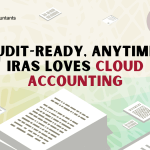The new 9% goods and services tax (GST) rate is expected to go into effect on January 1, 2024. According to an article released by the Inland Money Authority of Singapore (IRAS), the Singapore government intends to cover greater healthcare expenditure and provide enhanced support for our aging population with the additional money generated by the GST rise.
The GST increase adds another challenge to the ever-changing corporate landscape. By practicing strategic planning and preparing your firm through early preparatory checks and financial assessments, your company is more likely to survive and prosper in the aftermath of the increase in goods and services tax.
In this article, we will learn how to prepare your business for a GST 9% increase.
Voluntary GST Registration
GST is a consumption tax levied on imports of commodities and practically all supplies of products and services in Singapore. When your taxable turnover surpasses $1 million, you must register for GST.
Before registering, you should carefully examine the benefits and costs. Some advantages of registering for the goods and services tax include:
- If your company’s taxable turnover is slightly below the threshold, you will no longer need to constantly watch to ensure that registration is completed on time after the threshold is reached.
- If your firm involves exporting goods or delivering services to customers in other countries, you will benefit from goods and services tax relief on your purchases since the supplies qualify for zero-rating (i.e. charge GST at 0%).
On the other hand, the following disadvantages of should be considered:
- If your clients are not GST-registered, you will simply pass on the higher costs to them because maintaining the same price would only result in a drop in earnings.
- Additional administrative costs may be incurred by your firm to fulfill the requirements of being GST-registered, not to mention the time required to assure compliance with these tasks.
Update GST Rates in Business Processes
If you are a GST-registered business, you must ensure that every business system in use contains the new GST rate, which will be effective on January 1, 2024. Accounting and invoicing systems should be thoroughly tested and adjusted to reflect the current GST rate.
If you fail to account for GST at the correct rate, IRAS may levy fines on your firm, which can be costly and threaten your image. Customers may lose trust in your company, while your company’s operational and compliance costs may skyrocket.
Price Increases Should Be Communicated Clearly
Your customers will be affected by the GST increase just as much as your business, so it is vital to advise them of the pricing change in a straightforward and timely manner. To comply with IRAS rules, the revised GST-inclusive prices must be displayed, as well as the reasons for the increase.
Directly attributing unreasonable price rises to the increase in goods and services tax may result in an investigation by the Committee Against Profiteering. As a result, firms must be upfront and explicit about the reasons for price rises, and they must not mislead customers.
As a result, EBOS provides GST services as part of our suite of customer services. We take GST filing very seriously. Our services extend beyond simply filling out GST forms, as we have staff ready 24 hours a day, seven days a week to assist your business.
To learn more about our services, please contact us today.







